How ABA Therapy Supports Adaptive Living Skills Development
Empowering Independence Through ABA Therapy for Individuals with Autism


Understanding ABA Therapy's Impact
Adaptive living skills are crucial for individuals to live independently, particularly for those on the autism spectrum. Applied Behavior Analysis (ABA) therapy plays a significant role in supporting these skills. It equips individuals, especially children with autism, with the necessary competencies to engage effectively in daily life. This article explores how ABA therapy supports the development of adaptive living skills, delves into specific techniques used within therapy sessions, and discusses strategies for supporting the individuals' growth in educational and home environments.
The Role of ABA Therapy in Developing Essential Life Skills
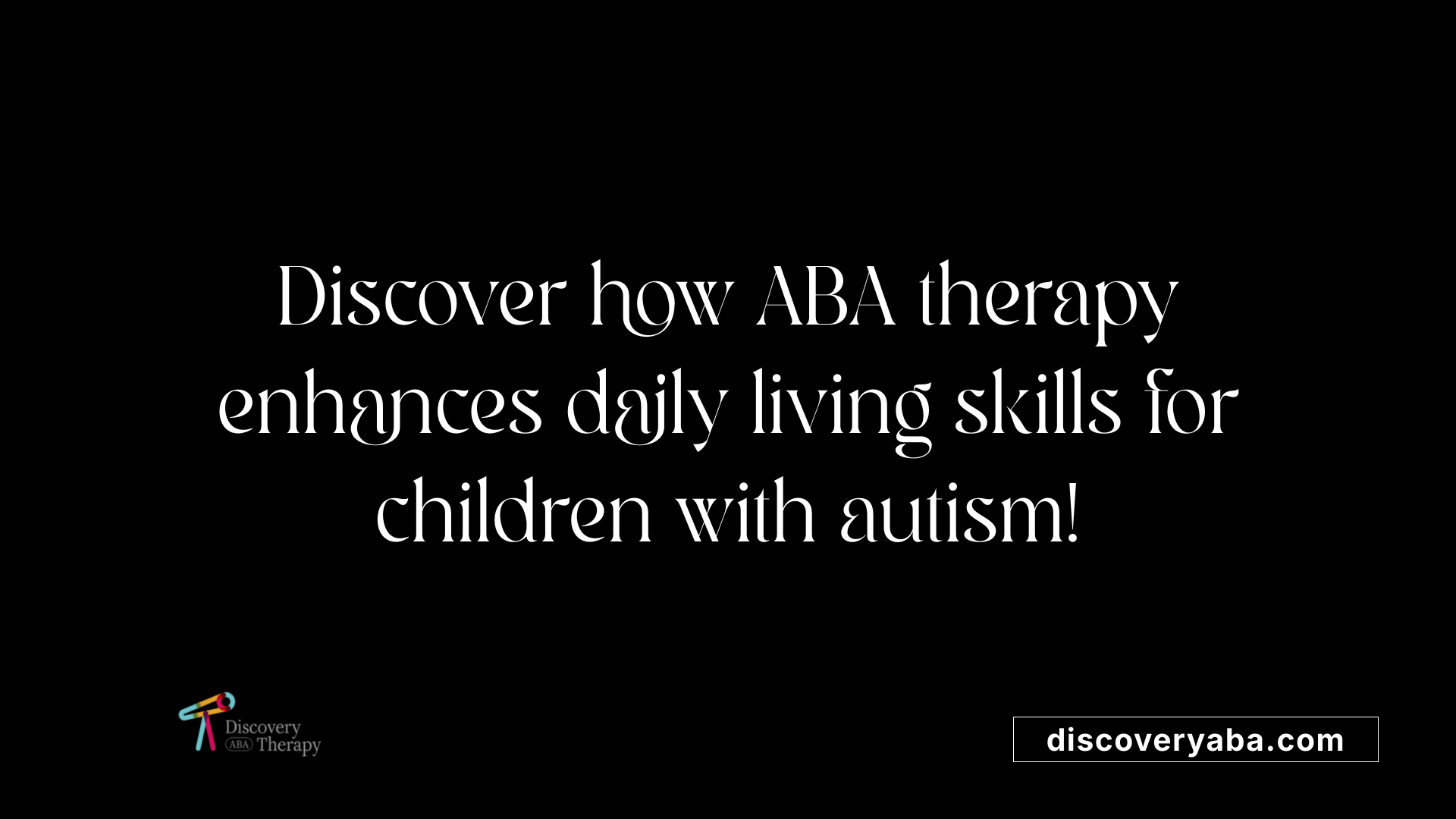
How does ABA therapy support the development of adaptive living skills in individuals, especially those with autism?
ABA therapy plays a crucial role in fostering adaptive living skills in individuals with autism through tailored interventions. These strategies include:
- Positive Reinforcement: Rewarding desirable behaviors helps strengthen the learning of essential skills, including self-care and social interactions.
- Gradual Guidance: Techniques such as prompting and modeling are employed to assist children in completing tasks. This guided practice helps reduce assistance as they gain confidence and independence.
- Task Analysis: Complex tasks, like personal hygiene routines, are broken down into smaller, manageable steps. This structured approach enables children to learn effectively, mastering skills such as brushing teeth or dressing.
Different categories of adaptive skills are targeted:
- Conceptual Skills: Include money management and basic literacy, crucial for practical day-to-day living.
- Social Skills: Understanding social cues and maintaining relationships enhances a child’s ability to interact with others.
- Practical Life Skills: Everyday tasks such as cleaning, cooking, and personal hygiene become manageable through targeted learning in a familiar environment.
The customized nature of ABA therapy is reinforced by the involvement of Board Certified Behavior Analysts (BCBAs) who design specific skill development plans. Research shows that individuals, even with average or above-average IQs, may struggle with daily living skills—highlighting the importance of structured learning to improve independence and overall quality of life for those on the autism spectrum.
Key Techniques in ABA Therapy for Independence

What specific techniques are used in ABA therapy to foster independence?
ABA therapy employs a variety of techniques to foster independence in individuals, particularly those with autism. Key methods include:
Task Analysis: This technique breaks complex tasks into manageable steps, making it easier for individuals to learn essential daily living skills. For example, brushing teeth is taught by delineating each step involved, from picking up the toothbrush to rinsing and putting it away.
Positive Reinforcement: This is a foundational principle of ABA therapy. By using rewards or praise, therapists reinforce desired behaviors, which motivates children to practice and master skills. This can be as simple as verbal praise or as structured as a reward system where children collect points for completing tasks.
Prompts and Fading: Prompts include verbal cues, visual aids, or physical assistance that guide children through completing tasks. As skills improve, the level of assistance is gradually reduced, promoting independence. This method encourages children to rely on their ability rather than on external prompts.
Natural Environment Teaching: Skills are taught in the child's everyday environment, applying learning to real-life situations. This approach supports generalization, allowing skills learned in therapy to be used in various settings.
These strategies work together, creating an effective framework that empowers individuals to become more independent and confident in their daily lives.
Effectiveness of ABA Therapy in Daily Living Skills and Beyond
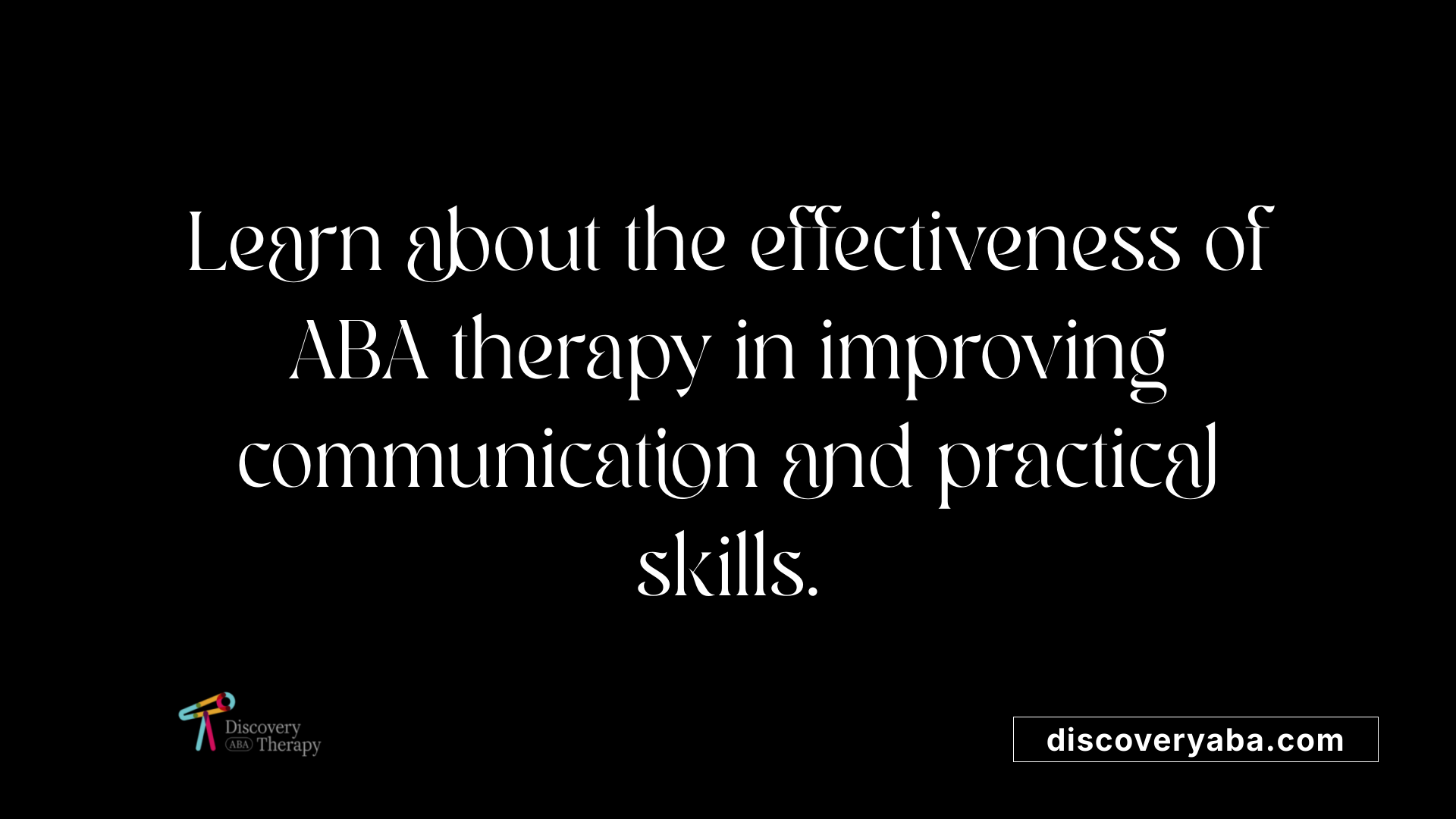
How effective is ABA therapy in improving daily living skills, communication, and community navigation?
ABA therapy is highly effective in improving daily living skills, communication, and community navigation for children with autism. This therapeutic approach tailors individualized programs that break tasks into manageable parts, aiding in skill development through techniques like task analysis.
Daily Living Skills
ABA focuses on essential self-care abilities such as:
- Dressing – Using prompting techniques to encourage independence.
- Grooming – Teaching personal hygiene tasks like brushing teeth and washing hands.
- Meal Preparation – Step-by-step guidance to promote self-sufficiency in the kitchen.
Reinforcement strategies, including positive feedback and rewards, encourage children to retain these skills effectively.
Communication
The therapy enhances communication abilities, enabling children to express their needs and navigate social situations better. Techniques such as visual supports and modeling help illustrate conversation cues, promoting better understanding and interpersonal interactions.
Community Navigation
ABA also addresses community navigation skills, preparing children to engage in public settings confidently. Skills taught include:
- Using Public Transportation – Understanding routes and schedules.
- Social Skills – Learning to read social cues and participate in group activities.
By fostering these critical adaptive skills, ABA therapy significantly increases children's independence and their quality of life.
Practical Teaching Strategies in Educational and Home Settings
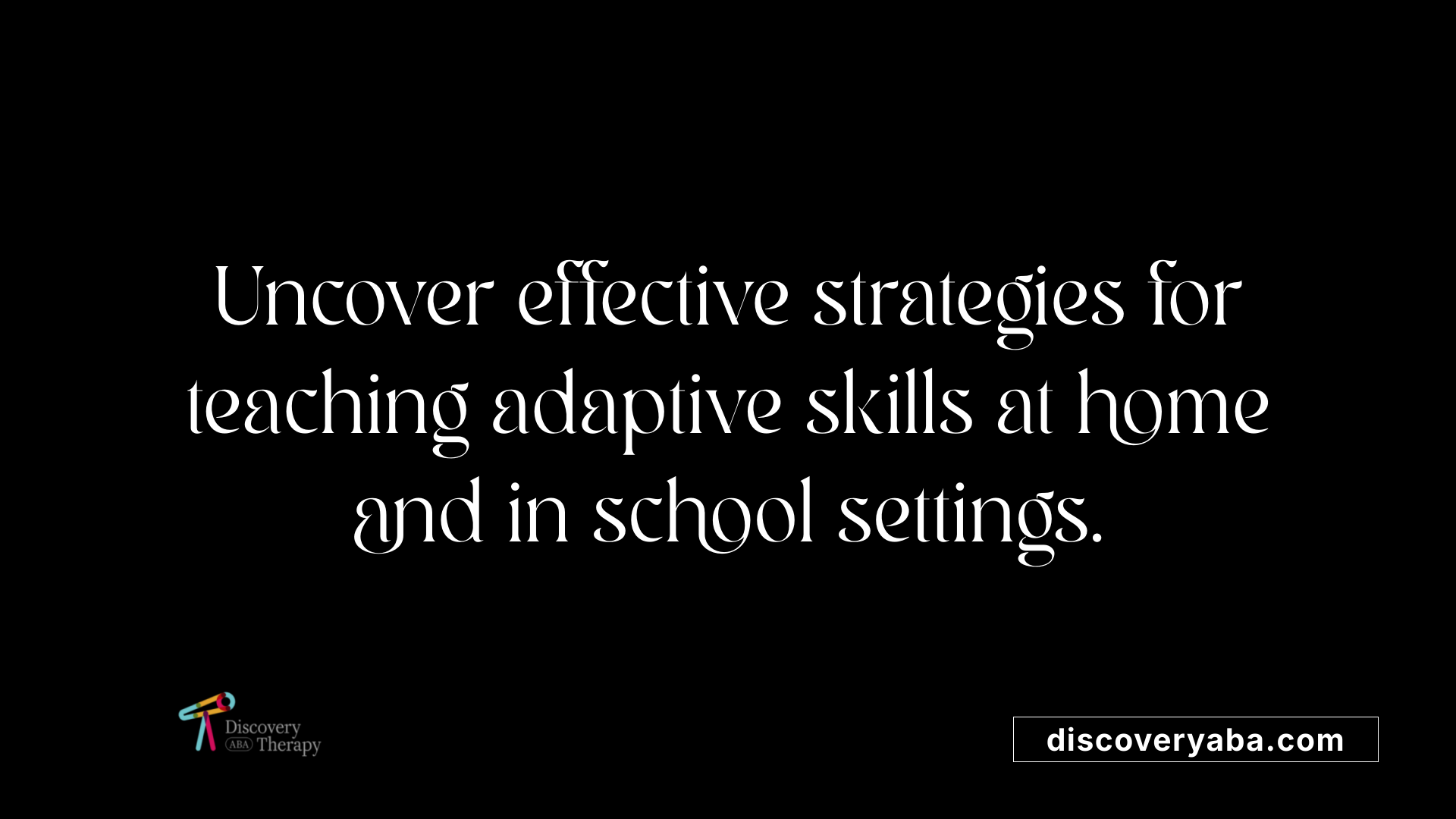
What teaching strategies are effective for developing adaptive skills in educational and home environments?
Effective teaching strategies in both educational and home settings are vital for developing adaptive skills in children. These strategies promote a comprehensive approach that encompasses personal care, cognitive development, communication, motor skills, and social integration. Here are some effective techniques:
Use of Visual Supports: Incorporating tools like visual schedules and cue cards can significantly help children with autism understand and complete multi-step tasks. These visuals act as guides, making it easier for them to follow directions and stay organized.
SELF-HELP Framework: This framework emphasizes consistency in routines, appropriate prompts, and the active involvement of parents. By focusing on individualized support, parents can reinforce what their children learn during therapy sessions at home.
Motivating Materials: Engaging toys and materials that resonate with the child can enhance the learning experience. When children find intrinsic value in the activities, they are more likely to participate and practice their skills.
Structured Curricula: Implementing structured programs, such as the AIM curriculum and the DNA-V model, can guide practitioners on teaching flexibility and self-sufficiency effectively. These curricula incorporate objectives that prepare learners for independent daily living.
Such strategies not only facilitate the mastery of adaptive skills but also enhance children's confidence in engaging with their environment.
Visual Supports
Visual supports play a critical role in helping children with autism understand tasks better. These tools can include:
| Type of Visual Support | Purpose | Examples |
|---|---|---|
| Visual Schedules | Help children anticipate and understand the sequence of daily activities | Daily routines, school schedules |
| Cue Cards | Provide prompts and instructions for specific tasks | Washing hands, getting dressed |
| Social Stories | Narratives that explain social situations and expectations | Sharing with peers, greeting others |
By using these supports, educators and families can promote independence and ease of task completion in children.
Parental Involvement
Parental involvement is crucial in the development of adaptive skills. Parents can take on roles that foster learning and application of skills from therapy sessions into everyday life:
- Reinforcement of Skills: Encourage parents to practice tasks with their children regularly to reinforce learning.
- Understanding Strategies: Teaching parents effective methods to prompt and guide their children can enhance consistency and outcomes across settings.
- Creating Routines: By establishing routines at home based on the child's therapy goals, parents help instill a sense of normalcy and relevance in skill application.
- Feedback Mechanisms: Regular communication between parents and practitioners can ensure that strategies are aligned and tailored to each child's needs, helping children to develop adaptive skills effectively.
The Importance of Family Collaboration in ABA Therapy
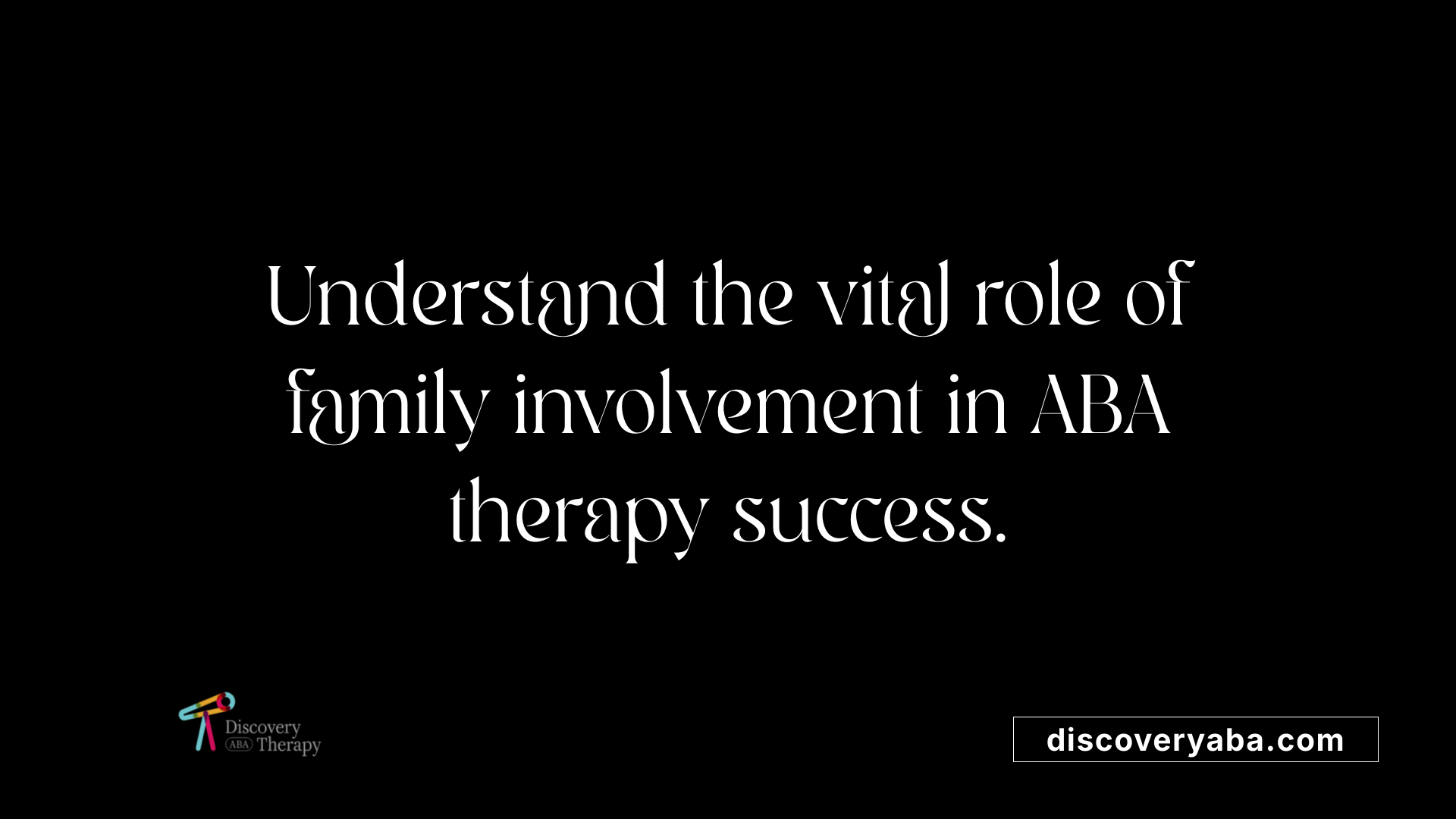
Family Involvement
Family participation is integral to the success of ABA therapy. When parents engage actively, they not only reinforce learning at home but also help in shaping personalized intervention plans that cater specifically to their child's needs. This cooperation ensures that skills such as dressing, grooming, and personal hygiene are practiced consistently, making progress more evident.
In-Home ABA Therapy
In-home ABA therapy provides a familiar and comfortable environment for children, allowing them to practice daily living skills in their natural settings. This approach fosters generalization, where individuals apply newly learned skills across various contexts. Families can observe techniques during sessions and learn how to implement them, streamlining the skill-building process at home. Additionally, enhancing parent involvement through guidance equips families with strategies to promote effective skill acquisition, improving overall outcomes for children with autism.
Long-term Benefits of Adaptive Living Skills
Skill Maintenance
Maintaining adaptive living skills is crucial for individuals with autism and other developmental challenges. Ongoing practice ensures that these skills remain sharp over time. Techniques such as regular review and practice in natural settings, like at home or in the community, help reinforce learned behaviors. In ABA therapy, the emphasis is placed on integrating daily living skills into routine activities, making them a natural part of life.
Independent Living
Developing adaptive living skills through ABA therapy significantly enhances the potential for independent living. Children learn to manage personal care, meal preparation, and financial responsibilities. These skills not only foster confidence but also promote social interactions, enabling individuals to engage more fully in their communities. The ability to take part in daily tasks is transformative, leading to improved quality of life as individuals grow into adulthood.
Enhancing Lives Through ABA Therapy
ABA therapy not only improves adaptive living skills but also transforms lives by empowering individuals and their families. Through personalized strategies and consistent practice, individuals with autism become better equipped to handle daily tasks, communicate effectively, and navigate social situations. The continued collaboration between professional therapists, parents, and teachers plays a crucial role in ensuring these skills are maintained and advanced. As these individuals gain independence, their overall quality of life improves, making ABA therapy a cornerstone in the journey toward fulfillment and autonomy.
References
- How ABA Therapy Helps Build Daily Living Skills for Autism
- How ABA therapy can help children with autism develop ...
- [PDF] Increasing Independence through the Teaching of Adaptive Skills in ...
- Adaptive Skills - PASEN.org
- Developing Daily Living Skills | Positive Behavior Services
- ABA Therapy and Life Skills for Everyday Independence
- [PDF] Addressing Adaptive Skills in the Classroom
Find More Articles

How to Handle Tantrums Using ABA Strategies

How ABA Therapy Addresses Repetitive Behaviors in Autism

How ABA Therapy Can Improve Sleep Patterns for Children with Autism

The Role of Generalization in Teaching Lasting Skills Through ABA Therapy

The Connection Between ABA Therapy and Improved Quality of Life

How ABA Therapy Supports Structured Learning in a Classroom Environment

How to Use ABA Strategies to Support Toilet Training

How to Use ABA Strategies to Support Toilet Training

Green Living Spaces for Autism Families

How ABA Therapy Supports Long-Term Independence and Life Skills

How ABA Therapy Supports Long-Term Independence and Life Skills

The Connection Between ABA Therapy and Emotional Regulation

How ABA Therapy Helps with Goal Achievement for Teens

How to Help Children Develop Self-Monitoring Skills with ABA Strategies

How to Use Prompting and Fading Techniques in ABA Therapy

How to Address Tantrums and Meltdowns with ABA Therapy

The Role of Visual Supports in ABA Therapy Sessions

How to Address Feeding Issues with ABA Therapy

How to Create a Structured Routine with ABA Techniques

How to Help Your Child Transition Between ABA Therapy and School

How to Address Impulsivity with ABA Therapy

The Connection Between ABA Therapy and Long-Term Skill Retention

How ABA Therapy Can Be Adapted for Different Learning Styles

The Connection Between Play and Learning in ABA Therapy

How to Make ABA Therapy Fun and Engaging for Your Child

ABA Therapy for Children with Severe Autism

How to Use ABA Therapy Techniques to Build Self-Care Skills

The Importance of Consistency in ABA Therapy Implementation

The Role of ABA Therapy in Teaching Self-Management Skills

How to Address Self-Stimulatory Behaviors in a Supportive Way

The Importance of Functional Communication Training in ABA Therapy

How Renewable Energy Supports Autism Communities

The Benefits of a Structured ABA Therapy Program

Creating Eco-Friendly Spaces for Autism

The Benefits of Parent-Implemented ABA Therapy Strategies

The Importance of Reinforcement Schedules in ABA Therapy
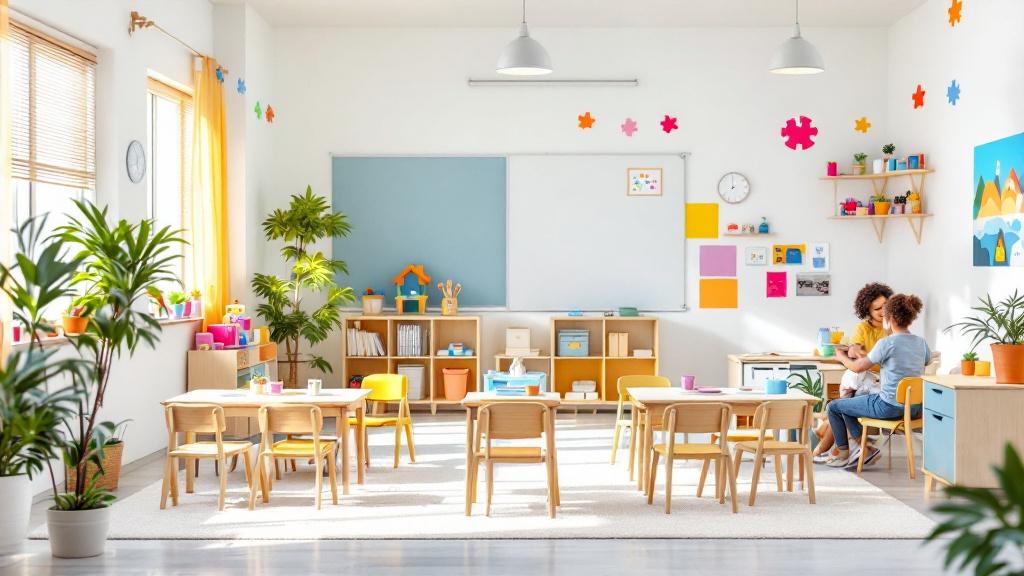
How to Support a Child with Autism in Group Learning Environments

The Connection Between ABA and Emotional Regulation

How ABA Therapy Helps Reduce Repetitive and Rigid Behaviors

Energy-Efficient Autism Community Resources

How to Use ABA Therapy to Reduce Excessive Repetitive Behaviors

The Role of Play in ABA Therapy

The Benefits of Combining ABA Therapy with Other Support Services

How ABA Therapy Helps Develop Self-Confidence in Children with Autism

How ABA Therapy Helps Develop Self-Confidence in Children with Autism

The Role of Play-Based ABA Therapy in Early Childhood Development

The Role of Goal-Oriented Sessions in ABA Therapy

How ABA Therapy Works: A Step-by-Step Guide

The Role of Self-Management Strategies in ABA Therapy

How ABA Therapy Supports Emotional Expression in Children

The Role of Parent Training in ABA Programs

How ABA Therapy Supports Positive Transitions Between Activities

How to Reinforce ABA Learning in Community Settings

The Role of Functional Behavior Assessments in Preventing Problem Behaviors

How School-Based ABA Therapy Supports Classroom Success

How to Choose Between At-Home and Center-Based ABA Therapy

How to Choose Between At-Home and Center-Based ABA Therapy

How ABA Therapy Helps Develop Conflict Resolution Skills

How to Identify the Best ABA Provider for Your Child

How to Use Token Economies in ABA Therapy

The Role of Peer Modeling in ABA Therapy Success

The Benefits of Naturalistic Teaching Approaches in ABA Therapy

What Is the ABCs of Behavior in ABA Therapy?

The Benefits of Group ABA Therapy for Social Skill Development

How to Encourage Positive Social Interactions with ABA Strategies

How to Introduce New Skills in ABA Therapy Without Overwhelming Your Child

The Benefits of Combining ABA Therapy with Other Interventions

Solar Power for Autism Support Networks

How to Address Hyperactivity with ABA Therapy

Common Misconceptions About ABA Therapy
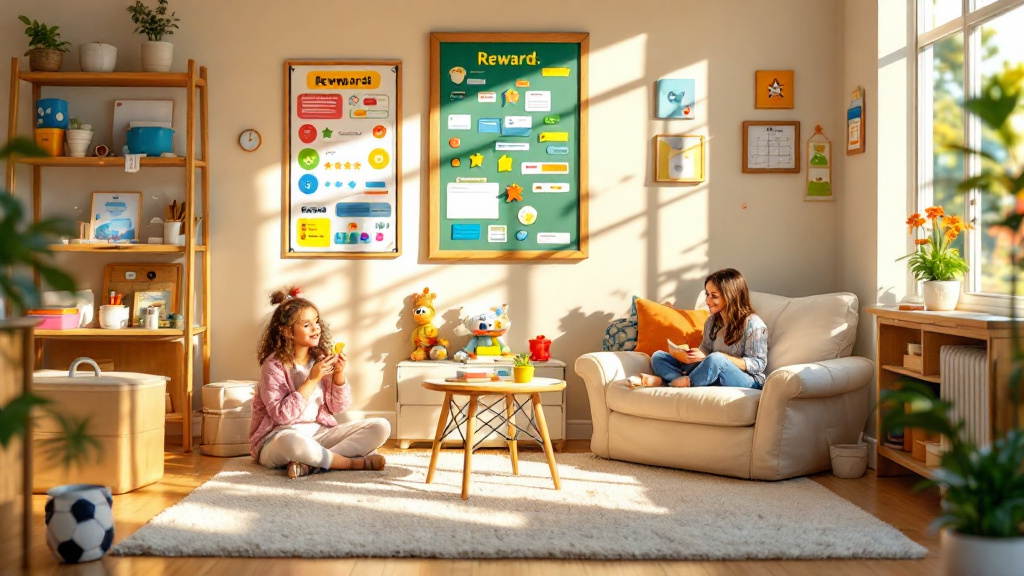
Understanding the Principles of Positive Reinforcement

Understanding the Principles of Positive Reinforcement

Understanding the Principles of Positive Reinforcement

How ABA Therapy Supports Transitions Between Activities

Understanding the Principles of Positive Reinforcement

How to Identify and Celebrate Small Successes in ABA Therapy Progress

Understanding the Principles of Positive Reinforcement

How to Introduce Visual Schedules for Better Behavior Management

How ABA Therapy Can Reduce Self-Injurious Behaviors

How ABA Therapy Supports Academic Success

The Importance of Early Signs Recognition and ABA Intervention

How ABA Therapy Helps Improve Comprehension and Listening Skills

How to Use Visual Schedules to Support Your Child’s ABA Goals

How ABA Therapy Supports Self-Help Skills Like Dressing and Eating

How ABA Therapy Supports Behavioral Success in Community Settings

How ABA Therapy Helps Build Independence in Daily Activities

Building Social Skills Through ABA Therapy Techniques

The Role of School-Based Behavior Intervention Plans (BIPs)

The Benefits of Scripting and Role-Playing in ABA Therapy

How to Help Your Child Develop Coping Strategies with ABA Therapy
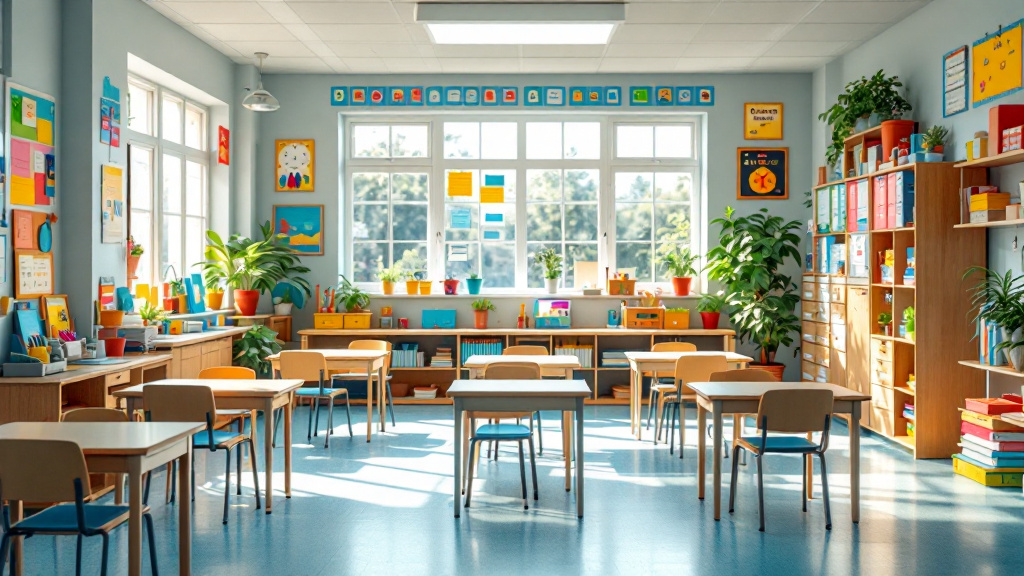
How to Address Hyperactivity and Attention Challenges with ABA Therapy

How to Help Your Child Develop Coping Strategies with ABA Therapy

How ABA Therapy Addresses Challenging Behaviors

The Importance of Social Skill Groups in ABA Therapy

How ABA Therapy Addresses Challenging Behaviors

The Role of Task Analysis in ABA Therapy for Teaching New Skills

How ABA Therapy Helps Improve Focus and Attention in the Classroom
%2520(1).jpeg)
Assessment Tools For People With Autism

Autism And Chronic Pain

How to Use Social Stories to Enhance ABA Therapy Outcomes
Contact us
North Carolina, Tennessee, Nevada, New Jersey, Utah, Virginia
New Hampshire, Maine
Massachusetts, Indiana, Arizona, Georgia
.avif)
